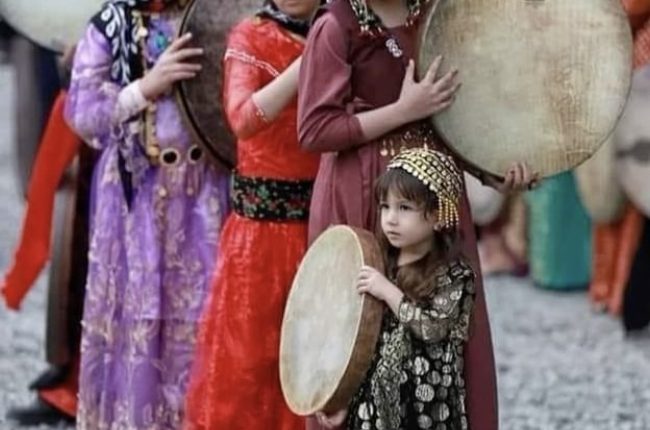An Introduction to Kurdish Folk Music
“No friends but the mountains” – Kurdish Proverb

 Kurdistan is the world’s largest stateless nation with a population of roughly 40 million ethnic Kurds living in a mostly mountainous region stretching nearly 75,000 square miles across Turkey, Syria, Iraq and Iran. The Kurds speak several dialects of Kurdish, an Indo-Iranian language and have lived in the region of Kurdistan for thousands of years. Western allies included a plan for an independent Kurdistan as they partitioned the Ottoman Empire after World War I. Under pressure from the Turks and a general lack of understanding of the region, this was scrapped at the Treaty of Lausanne in 1923. The Kurds have fought for their culture and identity ever since.
Kurdistan is the world’s largest stateless nation with a population of roughly 40 million ethnic Kurds living in a mostly mountainous region stretching nearly 75,000 square miles across Turkey, Syria, Iraq and Iran. The Kurds speak several dialects of Kurdish, an Indo-Iranian language and have lived in the region of Kurdistan for thousands of years. Western allies included a plan for an independent Kurdistan as they partitioned the Ottoman Empire after World War I. Under pressure from the Turks and a general lack of understanding of the region, this was scrapped at the Treaty of Lausanne in 1923. The Kurds have fought for their culture and identity ever since.
The Kurds have endured a great deal of discrimination with bans on their language, dress and music as well as decades of genocide and ethnic cleansing which are still actively ongoing today. Notably, when the Kurdish Peshmerga took up arms against Saddam Hussein in the late 1980s, the dictator responded by bombing the Kurdish village of Halabja with chemical weapons, killing an estimated 5,000 civilians and injuring upwards of 10,000. More recently, Kurdish forces PKK, YPG and YPJ have been on the front lines in the battle against ISIS despite wavering support from the U.S. and the West.
It is worth noting that the Kurds are unique in the broader Middle East when it comes to equal rights and it was the YPJ (Women’s Defense Units) that coined the rallying cry “JIN, JIYAN, AZADΔ meaning “Women, Life, Freedom” which has since been taken up by women’s rights movements, notably in Iran.
The most common themes in Kurdish folk music, in my estimation, are love, exile and resistance. Historically, the Dengbêj were, and still are, bards who recount local history and ancestral stories through song and storytelling. The human voice may be considered the most important musical instrument in traditional Kurdish music and illegal cassettes and CDs of singers found their way all over Kurdistan despite decades of government censorship. While there is no formal modal system, Kurdish music shares many elements with the Persian Dastgah as well as Ottoman and Arabic Makam modal systems with heavy use of partial flat microtones. Both vocal and instrumental ornamentation are heavily melismatic, wherein the primary note wavers over several notes. Dance rhythms have much in common with neighboring cultures with a number of syncopated 4/4 as well as dances in 9/8 (2223) and the 10/8 (3223) curcuna rhythm which is shared by Kurds, Armenians and Turks.
The Kurds employ traditional instruments typical of the region like the oud, various fiddles, as well as modern instruments like guitar and keyboard. That said, there are a large body of traditional Kurdish instruments that are still very popular across Kurdistan, often adding a strong statement of “Kurdishness” when employed in more modern settings. Kurdish percussion has roots in both ritual and folk traditions and the specifically Kurdish Daf is a mainstay. The Daf is a large frame drum with numerous rings inside. Other principal percussion instruments include the Darbuka (goblet drum aka Doumbek) and Dahol (large drum played with mallet & switch, aka Tupan and Davul) common across most of the eastern Mediterranean. Traditional wind instruments include the Blûr, an end blown shepherds flute (aka Kaval); the soft double reeded Mey (akin to the Armenian Duduk); and the loud double reeded Zurna common from the European Balkans in the west all the way to China in the east. Primary string instruments include the Tembûr, a short neck 2 course lute played primarily in eastern, Iranian Kurdistan with a unique upwards finger strumming technique; the Buzuq, a long neck 3 course lute played primarily in western, Syrian Kurdistan; and long necked 3 course Saz played primarily in northern, Turkish Kurdistan.












 Danûk – Wer Wer
Danûk – Wer Wer










